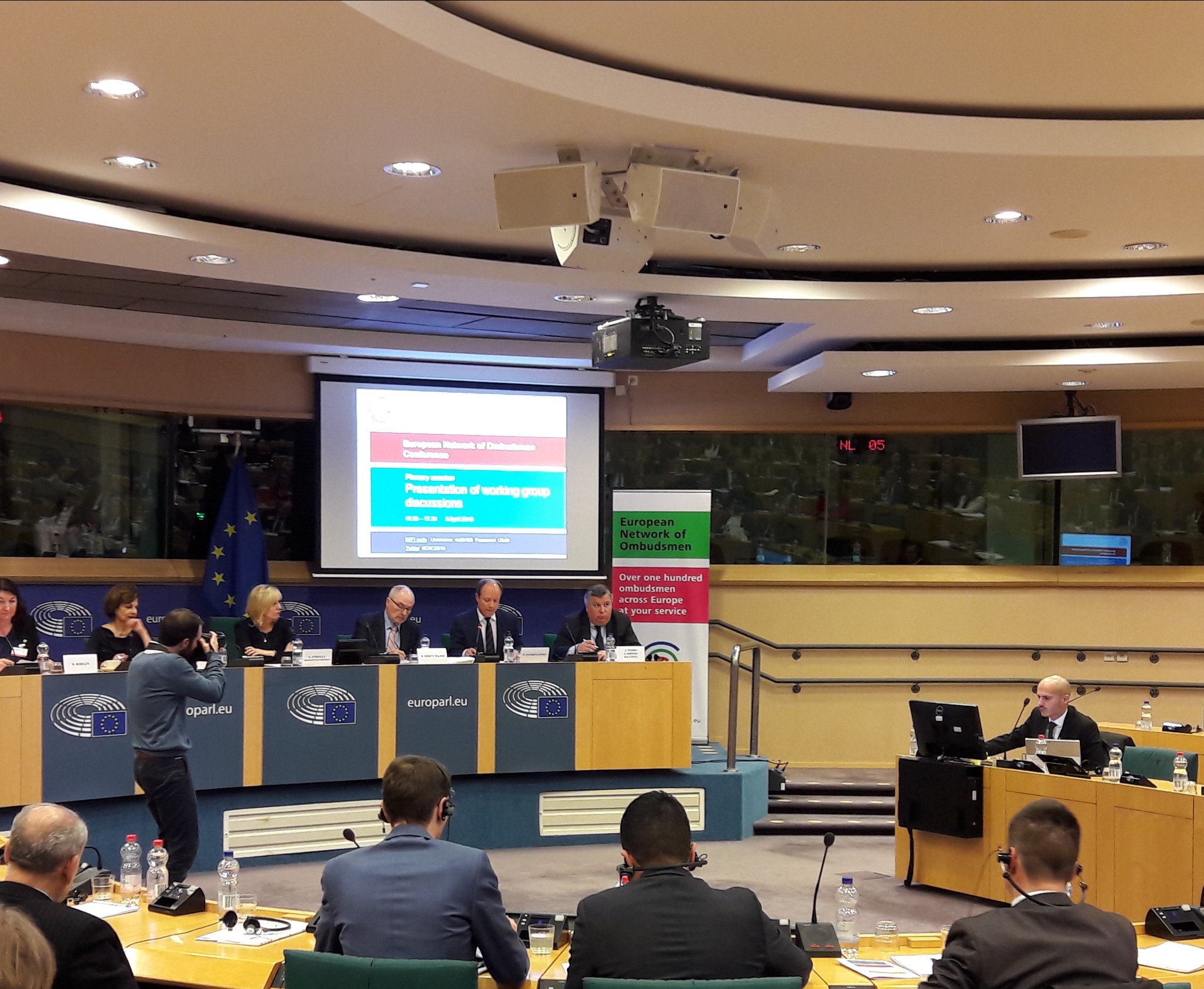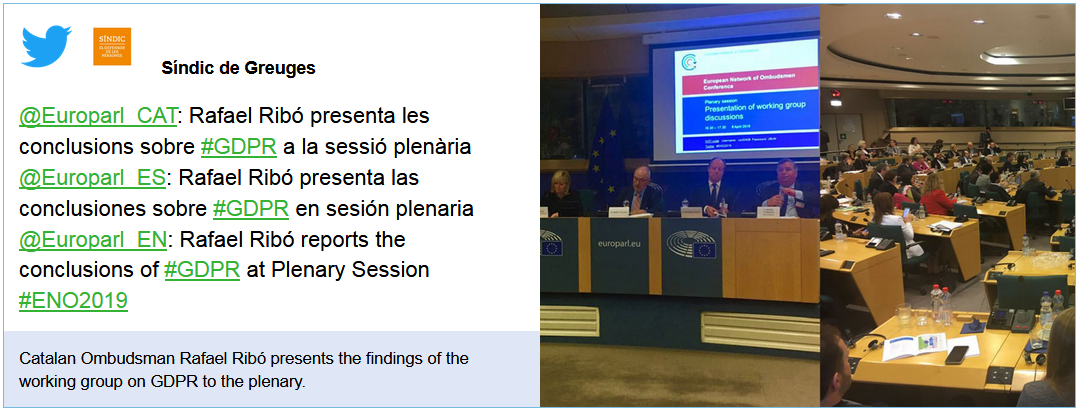
European Network of Ombudsmen
How ombudsmen can develop the use of ‘soft powers’ to maximise impact

Ombudsman institutions have an array of ‘soft powers’ at their disposal. How they use these powers depends on what they are trying to achieve, how controversial the issue is and what kind of public support they have. The working group on soft powers explored the reasoning behind using these powers, and the different methods various offices have for developing relations with various stakeholders.
These soft powers fall into two broad categories – formal and informal. Formal soft powers include investigating a complaint, own-initiative inquiries, reprimands and recommendations, whereas informal soft powers include media activities both traditional and online. Despite being soft, these powers can often be strong, as they are flexible and cannot typically be challenged in a court.
The work of the Finnish parliamentary ombudsman’s office is guided by two central permanent themes: (accessibility and an annual fundamental rights focusthe use of both of the country’s official languages), andas well as an annual human rights focus. These permanent and revolving themes are taken up during every inspection, as well as when the office is considering own-initiative investigations.
The European Ombudsman has been evolving and expanding how it uses own-initiative investigations to ensure that they are effective. These inquiries have to be based on clear suspicions of maladministration, and are carried out in a constructive rather than confrontational manner.
Recent examples of own-initiative inquiries include the transparency of the EU-US trade (TTIP) negotiations and the accountability of legislative work in the Council of the European Union, where Member State governments decide their positions on draft EU laws.
Despite being soft, these powers can often be strong, as they are flexible and cannot typically be challenged in a court.
‘Strategic initiatives’, by contrast, are an exploratory tool where the European Ombudsman has consciously decided not to use all her powers (for example, they do not involve inspections). Instead, they are about raising an issue, seeking information and making suggestions.
These initiatives have been used to show that the European Ombudsman is aware of citizens’ concerns about a particular issue, and is responding to these concerns quickly. One recent example, in the wake of the MeToo movement and revelations, involved asking 26 EU institutions and agencies to set out what anti-harassment policies they have in place. The European Ombudsman then made a series of general suggestions to the EU administration on anti-harassment policy and practices.

 EOA viestintä
EOA viestintä
@oikeusasiamies Petri Jääskeläinen esittää #eno2019 konferenssissa yhteenvedon teemasta "developing soft powers". JO Petri Jääskeläinen framför ett sammandrag om temat "developing soft powers" under #eno2019 konferensen.
Finnish parliamentary Ombudsman Petri Jääskeläinen gives an overview of the different ways ombudsmen can use their soft powers.


The discussion focussed on practical ways in which ombudsman offices seek to raise awareness about their role and work, involve stakeholders and be more accessible to the public. Having clear rules on how to engage with complainants, and seeking feedback from the public on how they carry out their work, can help strengthen the credibility of ombudsman offices. This can be done by outreach activities around the country.
Building alliances is important for getting results. The working group discussed how important it is to have different bodies – including the ombudsman – speaking with one voice on an issue. This increases pressure on an administration to take action.
Other ways of using soft powers include supporting civil society, particularly in countries where it is under pressure. One particularly innovative idea involved inviting stakeholders to discuss the ombudsman’s investigation agenda for the coming year.
The implications of the General Data Protection Regulation for the work of ombudsmen and petitions committees

European Data Protection Board Secretariat 1
Since it became applicable, on 25 May 2018, the GDPR has raised questions from different sectors, including public authorities and institutions, as to how it applies to them. The GDPR represents an evolution, not a revolution, in the field of data protection. Not only have many of the provisions of the previous Data Protection Directive been moved to the new regulation (albeit several in a more expanded manner) 2 , but its principle-based, technologically-neutral approach remains at the core of the regulation.
The overall objective of the GDPR is clear: to lay down rules for protecting natural persons regarding the processing and free movement of their data. However, it also, just as importantly, aims to protect their fundamental rights and, in particular, their right to the protection of personal data (a fundamental right on its own, enshrined in article 8 of the EU Charter of Fundamental Rights).
To know whether the GDPR applies, it is important to take a step back and look at the basics. The concept of personal data means any information relating to an identified or identifiable natural person. The definition has been developed and interpreted, throughout time, by EU case-law and in opinions of the former Article 29 Working Party, or WP29 (now the European Data Protection Board).3
Processing, on the other hand, means anything that is done to personal data, whether or not by automated means. The GDPR applies specifically to the processing of personal data that is done, wholly or partly, by automated means; and to the processing, other than by automated means, of personal data that form part of a filing system or are intended to do so. This definition, and its components, have also been the subject of EU case-law.

 Síndic de Greuges
Síndic de Greuges
@Europarl_CAT: Rafael Ribó presenta les conclusions sobre #GDPR a la sessió plenària
@Europarl_ES: Rafael Ribó presenta las conclusiones sobre #GDPR en sesión plenaria
@Europarl_EN: Rafael Ribó reports the conclusions of #GDPR at Plenary Session
#ENO2019
Catalan Ombudsman Rafael Ribó presents the findings of the working group on GDPR to the plenary.


Another essential concept is that of controller, the natural or legal person, public authority or body that, alone or with others, determines the purposes and means of the processing operation and is responsible, under the principle of accountability, to demonstrate compliance with the GDPR.4 It should be underlined that this is not the role, nor the responsibility of data protection officers (DPO) that each organisation is supposed to appoint.5
Finally, any individual, institution or body processing personal data needs to ensure that it has an adequate legal basis to conduct the processing, in accordance with the principle of lawfulness. The GDPR offers different legal bases.6 The consent of the data subject is one such base. However, when processing personal data, public institutions should reflect carefully on which legal basis is the most adequate for carrying out their tasks.7
Public authorities and bodies, such as national ombudsmen and petitions committees, should therefore be required to comply with the GDPR.
Therefore, when processing personal data, ombudsmen and petitions committees will, in principle, be required to comply with the GDPR. That means, in practice, complying with its principles and obligations. These include (but are not limited to): duties of transparency and informing data subjects; ensuring individuals’ rights regarding their personal data; keeping a record of processing activities; notifying data breaches; designating a DPO.
In addition, each Member State is required to appoint one or more data protection authority (DPA) to monitor the application of the GDPR, which also applies to public bodies subject to the GDPR (with one exception: courts acting in their judicial capacity).8 Therefore, national ombudsmen and petitions committees will, in principle, be subject to the supervision of DPAs, and should liaise with them for any questions concerning their processing activities (among other powers, DPAs can also provide advice and guidance). That also means that public bodies are subject to different types of remedies, including the fines foreseen in the GDPR. In the latter case, a Member State may lay down the rules on whether and to what extent fines may be imposed on public authorities and bodies.9 However, DPAs’ decisions can be subject to a challenged in court.10
In conclusion, the GDPR has allowed the field of data protection law to evolve, but has not radically changed it. Public authorities and bodies, such as national ombudsmen and petitions committees, should therefore be required to comply with the GDPR, which means being subject to the duties and supervision that come with compliance.
[1] This opinion was drafted by the EDPB secretariat and does not constitute or reflect the views of the board or its members, nor should it be understood as constituting guidance provided by the Board in the terms foreseen in the GDPR. More information about the EDPB can be found here: https://edpb.europa.eu/about-edpb/about-edpb_en.
[2] For example, the transformation of the Article 29 Working Party into the European Data Protection Board; the development of the role and powers of supervisory authorities; a stronger emphasis on the principle of accountability.
[3] See, in particular, the one on the concept of personal data (04/2007): https://ec.europa.eu/justice/article-29/documentation/opinion-recommendation/files/2007/wp136_en.pdf.
[4] An opinion of WP29 (01/2010) on the concept of controller and processor can be found here: https://ec.europa.eu/justice/article-29/documentation/opinion-recommendation/files/2010/wp169_en.pdf. It has also been discussed in the context of CJEU jurisprudence.
[5] EDPB guidance on the role of data protection officers can be found here: https://ec.europa.eu/newsroom/article29/item-detail.cfm?item_id=612048.
[6] See article 6 GDPR.
[7] On the concept of consent, see the EDPB’s guidelines: https://ec.europa.eu/newsroom/article29/item-detail.cfm?item_id=623051.
[8] See articles 51, 55(3) and 57 GDPR.
[9] See recital 150 and article 83 GDPR. See in particular article 83.7 GDPR
[10] See article 78 GDPR.
The consequences of demographic challenges and ageing societies

Average life expectancy in the European Union has increased from 60 years of age in the 1960s to over 80 today, while fertility rates have fallen to below 1.6 children per woman. EU countries are struggling to adapt to this changed situation, and meet senior citizens’ healthcare and housing needs.
The working group opened by looking at how the demographic situation has evolved in two specific EU countries, which allowed ombudsmen to report on the situation of senior citizens in their countries and their efforts to help.
Ombudsman offices singled out the ‘empty village’ syndrome as the biggest challenge in human terms. After the fall of the Iron Curtain, many young people emigrated from parts of Eastern and Central Europe to Western Europe. This compounded earlier emigration waves and, combined with declining fertility rates, has led to the disintegration of the social fabric particularly in villages, leaving behind lonely, vulnerable elderly people. Their needs are not just material, they are also emotional.
Senior citizens mostly experience discrimination in relation to the labour market, public services and insurance costs.
Ageism featured heavily in the discussions. Senior citizens mostly experience discrimination in relation to the labour market, public services and insurance costs. Exorbitant insurance tend to deter those over 70 from travelling. Senior citizens also encounter many obstacles when seeking medical treatment or to join family members in an EU Member State other than their own. The working group also discussed cases of mistreatment of elderly people by their own relatives or staff in nursing homes, and the lack of support for carers.
Governments also face challenges. For one, policies aimed at preventing the rural exodus, and encouraging young people to stay, are costly. Additionally, the hospitalisation of elderly people living alone is a huge strain on health and social security systems. A high proportion of those aged 65 and over are on long-term medication, suffer from a chronic disease and/or are overweight.
Unrelated to ageing, but a demographic challenge nonetheless, are large Roma families with high illiteracy levels in certain EU countries. In order to improve their education levels, governments need to provide Roma children with programmes tailored to their needs, to prepare them for integration into the labour market, and society as a whole.
Elderly people need support and help from independent and trustworthy institutions, such as ombudsman offices. The role of these offices in protecting rights has been expanding. Powers include conducting spot checks in private and public mental health institutions, nursing homes and children’s homes.
Ombudsman institutions also play a major role in educating senior citizens on their rights. There are those who host weekly television shows to explain their work, and adapt the language to the needs of people with cognitive impairment. Ombudsman offices also regularly conduct surgeries to help elderly people in their dealings with public authorities. By lodging complaints of ageism with the constitutional court, several ombudsman offices have contributed to resolving housing problems and guaranteed a minimum income for senior citizens.
The working group concluded with suggestions for improvement. Some ombudsman offices advocate greater coordination with the private and public sectors, for instance in connection with house visits and monitoring public service agencies, such as the police forces. With ever-growing digitalisation, ombudsman offices urge governments to extend the use of digital solutions to senior citizens, whilst ensuring that alternatives remain available.